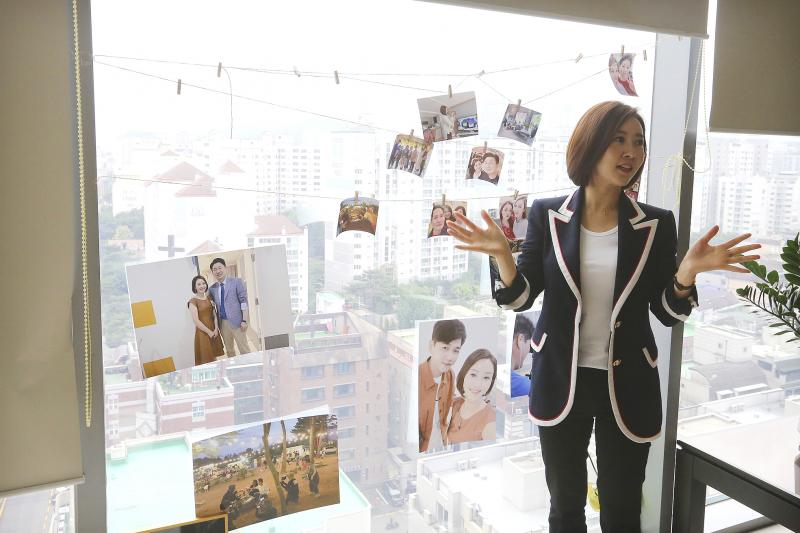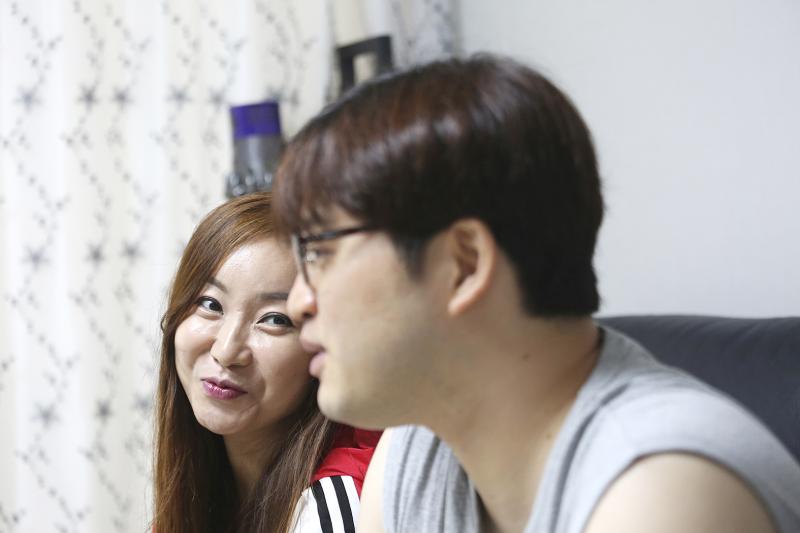On their second date last year, feeling a little drunk at a seaside restaurant, Kim Seo-yun let slip a revelation to her South Korean love interest: She had fled North Korea a decade ago, something that sometimes made her feel ashamed in a country where North Korean defectors can face discrimination.
Her companion, Lee Jeong-sup, jokingly asked if she was a spy but then told her there was nothing wrong with coming from North Korea.
Lee proposed in March and in June they got married at a Seoul hotel. Kim’s family, still in North Korea, obviously couldn’t attend.

Photo: AP
“In South Korea, my husband is my everything. I have no one else here. He told me that he would play the role of not only my husband but also my parents,” Kim, 33, said. “I feel much more stable now.”
It’s an increasingly common scenario.
More than 70 percent of the 33,000 North Koreans who have fled to South Korea are women, a reflection in part of North Korea’s tendency to more closely monitor men.

Photo: AP
While there are no official numbers on how many North Korean defectors have married South Korean men, a government-funded survey last year of 3,000 North Koreans living in the South suggested that 43 percent of married women were living with South Korean husbands, up from 19 percent in 2011.
Arriving from a nominally socialist, extremely repressive society, these women often struggle to adjust to fast-paced, capitalistic lives in South Korea. They also face widespread discrimination, bias and loneliness.
Some said they looked to marry South Korean men because they thought they would help them navigate their sometimes bewildering new lives.
“I feel like my marriage is letting me acclimate to this society more deeply without too much hard work,” Hwang Yoo-jung, 37, said about her 2018 union with a South Korean man. The number of matchmaking companies specializing in pairing North Korean women with South Korean men has seen an explosion, with 20 to 30 such agencies now operating, up from two in the mid-2000s.
“I get a big sense of achievement from paring these couples because I also came here alone and know [the suffering] of other refugees,” said Kim Hae-rin, who runs a match-making agency in Seoul. “I also think I’m creating small inter-Korean unifications.”
Many women who flee North Korea turn to matchmaking agencies, often run by fellow defectors, to find South Korean husbands. The companies typically charge South Korean men 3 million won (US$2,520) for several blind dates in a year; most women aren’t charged. No such matchmaking services exclusively cater to male defectors, who often marry other North Koreans or live alone.
Kim Seo-yun runs another one of those companies, called Unikorea, though she met her husband, Lee, at a dinner arranged by a friend.
“When I talked with her, I felt we could develop a special relationship,” said Lee, 32, who works for a food company. “Whether she came from North Korea doesn’t matter much. I told her I’d be fine as long as she didn’t have a previous marriage, a secret baby or a criminal record.”
There are, however, rough patches for some of the couples, who share a language and ethnicity but can often seem like exotic foreigners to one another. They are, after all, attempting to bridge a 75-year-old division of the Korean Peninsula.
Lee said he tries to use less of the English loan words favored in the South during conversations with his wife, who sometimes baffles him by using North Korean slang that he doesn’t totally understand.
Hwang said that she feels “really, really happy” when her husband Seo Min-seok, 39, takes her to a gathering of his friends and their wives, where she faces many questions about North Korea.
Seo said he doesn’t usually ask Hwang about her past in North Korea.
Husbands sometime tease their wives with North Korea-themed jokes.
Defector So Yu-jin said her South Korean husband told her, “You’re just like Kim Jong-un,” the North Korean leader, when she made a decision on family affairs without consulting him. She said he still likes hanging around with her North Korean defector friends, who he says are more forthright about their feelings than South Koreans.
Not all couples thrive.
Ahn Kyung-su, a researcher with a private institute studying health issues in the North, said some of the North Korean defectors he’s interviewed told him that their South Korean husbands looked down on them and abused them.
For many of the women who fled to South Korea, there is also the lingering heartache of being separated from families left behind in the North.
Kim Seo-yun said she misses her parents and younger sister in North Korea and hopes to reunite with them one day.
She said her mother sometimes calls her from a mountain where she pays a broker for the use of an illegal Chinese cellphone. When her mother called her in March, Kim told of her upcoming marriage, saying that she would marry “a tall guy who cares for me a lot.”
In early June, Kim’s mother called Lee for a one-minute conversation. Lee said he didn’t really understand what his future mother-in-law was saying because of her strong North Korean accent. After hearing a recording, Kim told Lee that her mother asked him to take care of her daughter.
“Now, my husband is filling my heart. My mother-in-law treats me well. So does my sister-in-law. It’s like having strong supporters in my life, and I’m happy now,” Kim said.

May 18 to May 24 Pastor Yang Hsu’s (楊煦) congregation was shocked upon seeing the land he chose to build his orphanage. It was surrounded by mountains on three sides, and the only way to access it was to cross a river by foot. The soil was poor due to runoff, and large rocks strewn across the plot prevented much from growing. In addition, there was no running water or electricity. But it was all Yang could afford. He and his Indigenous Atayal wife Lin Feng-ying (林鳳英) had already been caring for 24 orphans in their home, and they were in

On May 2, Chinese Nationalist Party (KMT) Chairman Eric Chu (朱立倫), at a meeting in support of Taipei city councilors at party headquarters, compared President William Lai (賴清德) to Hitler. Chu claimed that unlike any other democracy worldwide in history, no other leader was rooting out opposing parties like Lai and the Democratic Progressive Party (DPP). That his statements are wildly inaccurate was not the point. It was a rallying cry, not a history lesson. This was intentional to provoke the international diplomatic community into a response, which was promptly provided. Both the German and Israeli offices issued statements on Facebook

Even by the standards of Ukraine’s International Legion, which comprises volunteers from over 55 countries, Han has an unusual backstory. Born in Taichung, he grew up in Costa Rica — then one of Taiwan’s diplomatic allies — where a relative worked for the embassy. After attending an American international high school in San Jose, Costa Rica’s capital, Han — who prefers to use only his given name for OPSEC (operations security) reasons — moved to the US in his teens. He attended Penn State University before returning to Taiwan to work in the semiconductor industry in Kaohsiung, where he

President William Lai (賴清德) yesterday delivered an address marking the first anniversary of his presidency. In the speech, Lai affirmed Taiwan’s global role in technology, trade and security. He announced economic and national security initiatives, and emphasized democratic values and cross-party cooperation. The following is the full text of his speech: Yesterday, outside of Beida Elementary School in New Taipei City’s Sanxia District (三峽), there was a major traffic accident that, sadly, claimed several lives and resulted in multiple injuries. The Executive Yuan immediately formed a task force, and last night I personally visited the victims in hospital. Central government agencies and the